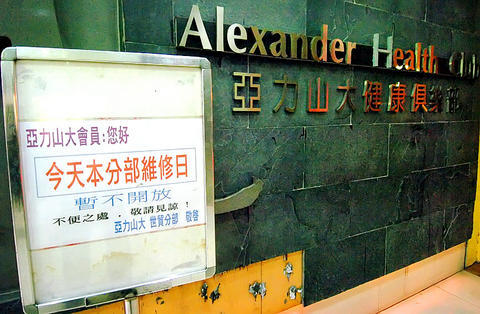Battered by financial difficulties, the Alexander Group (亞力山大集團), parent company of the nation's leading fitness centers, Alexander Health Clubs, (亞力山大健康休閒俱樂部), yesterday shut down all of its 20 branches without prior notice to members.
"I regretfully announce that all branches have suspended operations," company chairwoman Candy Tang (
Tang said that the company had experienced plummeting sales over the past two-and-a-half years caused by a "poorly performing economy, the fallout of credit and cash-card defaults and rising inflation."

PHOTO: CHU PEI-HSIUNG, TAIPEI TIMES
In spite of an estimated NT$2 billion in annual revenues, Tang yesterday claimed that the company's board was recently scammed for NT$95 million, which triggered a liquidity problem to her already financially troubled gyms.
She did not say whether the company would reimburse some 10,000 members as well as the company's 1,000 or so employees.
Disappointed gym members yesterday besieged the company's outlets, with some accusing the Alexander Group of fraud.
A woman surnamed Lin, interviewed on TV yesterday, said that she had signed a contract with Alexander on Sunday.
"Knowing that it may soon suspend operations, Alexander were still touting for new members," Lin said.
Chen Po-ching (
She also lambasted the company for having only notified its employees of their fate by brief messages after reaching a decision to suspend operations at around 2am yesterday morning.
A joint lawsuit can only be brought by a group of more than 20 consumers before applying for a juncture to freeze company assets, Chen said, who also urged members to contact their banks as soon as possible to discontinue monthly payments.
Wu Cheng-hsue (吳政學), director-general of the Consumer Protection Commission, said he had had problems reaching company executives yesterday, including Tang, who was once named one of the best female businesswomen in Asia.
At the age of 22, Tang opened her first dance club expanding her business and founding the Alexander Group in 1993.
However, the group has been suffering from financial difficulties after tapping into Chinese markets by establishing a Shanghai-based flagship fitness center in 2002 with capital of NT$50 million and three other Chinese branches.
Domestic banks including First Bank (
Pending contract terms, Chinatrust will assist the bank's credit cardholder members of Alexander to seek legal compensation should the firm's closure be permanent, the bank said in a statement yesterday.
The bank will also stop cardholders' monthly payments to Alexander.
Taipei prosecutors yesterday said that Alexander may face fraud charges, without ruling out the possibility of preventing Tang from leaving the country.
The Council of Labor Affairs yesterday vowed to press Alexander for follow-up compensation for its employees, including salaries for this month and redundancy payments.

JITTERS: Nexperia has a 20 percent market share for chips powering simpler features such as window controls, and changing supply chains could take years European carmakers are looking into ways to scratch components made with parts from China, spooked by deepening geopolitical spats playing out through chipmaker Nexperia BV and Beijing’s export controls on rare earths. To protect operations from trade ructions, several automakers are pushing major suppliers to find permanent alternatives to Chinese semiconductors, people familiar with the matter said. The industry is considering broader changes to its supply chain to adapt to shifting geopolitics, Europe’s main suppliers lobby CLEPA head Matthias Zink said. “We had some indications already — questions like: ‘How can you supply me without this dependency on China?’” Zink, who also

The number of Taiwanese working in the US rose to a record high of 137,000 last year, driven largely by Taiwan Semiconductor Manufacturing Co’s (TSMC, 台積電) rapid overseas expansion, according to government data released yesterday. A total of 666,000 Taiwanese nationals were employed abroad last year, an increase of 45,000 from 2023 and the highest level since the COVID-19 pandemic, data from the Directorate-General of Budget, Accounting and Statistics (DGBAS) showed. Overseas employment had steadily increased between 2009 and 2019, peaking at 739,000, before plunging to 319,000 in 2021 amid US-China trade tensions, global supply chain shifts, reshoring by Taiwanese companies and

Taiwan Semiconductor Manufacturing Co (TSMC, 台積電) received about NT$147 billion (US$4.71 billion) in subsidies from the US, Japanese, German and Chinese governments over the past two years for its global expansion. Financial data compiled by the world’s largest contract chipmaker showed the company secured NT$4.77 billion in subsidies from the governments in the third quarter, bringing the total for the first three quarters of the year to about NT$71.9 billion. Along with the NT$75.16 billion in financial aid TSMC received last year, the chipmaker obtained NT$147 billion in subsidies in almost two years, the data showed. The subsidies received by its subsidiaries —

Shiina Ito has had fewer Chinese customers at her Tokyo jewelry shop since Beijing issued a travel warning in the wake of a diplomatic spat, but she said she was not concerned. A souring of Tokyo-Beijing relations this month, following remarks by Japanese Prime Minister Sanae Takaichi about Taiwan, has fueled concerns about the impact on the ritzy boutiques, noodle joints and hotels where holidaymakers spend their cash. However, businesses in Tokyo largely shrugged off any anxiety. “Since there are fewer Chinese customers, it’s become a bit easier for Japanese shoppers to visit, so our sales haven’t really dropped,” Ito